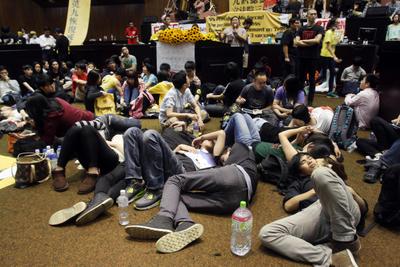The legacy of Japanese imperialism is also controversial within Taiwan, Japan’s former colony, and is intertwined with the fraught politics of ROC-PRC relations. The Chinese nationalist position, broadly shared by Kuomintang (KMT) and Communists (CCP), views Japan’s rule (1895–1945) as a humiliating interregnum in an otherwise unbroken record of Taiwan–mainland unity. By contrast, proponents of the island’s distinctiveness point to Japanese colonialism as one factor in shaping a multicultural Taiwanese identity.
The period since democratisation in the 1990s has witnessed repeated tussles between proponents of these rival visions, focusing especially on the school curriculum for history. Eight years of rule by the pro-independence Democratic Progressive Party (DPP) under President Chen Shui-bian (2000–08) culminated in an uneasy compromise: coverage of Chinese history maintained the established orthodoxy, while that of Taiwan reflected a more separatist slant.
This often boils down to seemingly minute terminological distinctions. For example, in narrating Taiwan’s past, current textbooks use equivalent language to describe ‘rule’ by the Dutch, the Japanese and various Chinese regimes.
Failure to distinguish clearly between ‘legitimate’ Chinese rule and ‘illegitimate’ foreign control is anathema to Beijing and to KMT conservatives alike. Since its return to power in 2008, the KMT has sought to reinstate elements of the old Chinese nationalist orthodoxy. But given the political sensitivities involved, this is no easy task.
Taiwanese President Ma Ying-jeou owes his mandate to promises to prioritise economic growth, which means improving commercial relations with mainland China. Mainstream public opinion seems fatigued with the bickering over identity that characterised the preceding DPP administration. Nonetheless, Taiwan’s political centre of gravity has unmistakably, and probably irreversibly, shifted towards a moderately separatist position. More or less content with the current de facto independence, most people are concerned primarily with improving their livelihoods. But most adamantly oppose political integration with the PRC.
Since 2008, the KMT has promoted closer ties with China, establishing regular direct commercial flights and opening up to mainland tourists. But it has refrained from initiating significant school curricular change — until now. Three weeks before February’s Nanjing meeting, revisions to officially approved high school history textbooks were announced. Henceforth, Japan’s ‘colonial rule’ or Holland’s ‘occupation’ must be distinguished from the legitimate government of the Qing Court or the ROC after 1945. Unduly positive coverage of Japan’s colonial legacy must become more ‘neutral’, as must unduly negative accounts of the KMT’s martial law era (1949–87).
Officially billing these changes as part of a general round of ‘minor’ curricular revisions, the Ministry of Education insists they are necessary to ensure proper neutrality. The most contentious move, requiring use of ‘the Chinese mainland’ rather than ‘China’ in discussions of cross-Strait relations, is justified by reference to the ROC constitution, which underlines Taiwan’s status as part of ‘one China’.
The response from pro-independence groupings has been predictably furious. DPP chairman Xavier Chang claims the revisions amount to a ‘major reform’, demanding widespread consultation. Teachers and activists have picketed the Education Ministry in Taipei, and a number of cities have witnessed demonstrations. On 21 February, opposition members of parliament staged a boycott over the issue.
Partisan accusations certainly surround the timing of this dispute. A pro-KMT figure writing in the China Times accused the DPP of protesting to distract attention from the government’s ‘success’ at Nanjing. But the opposite is just as likely: that the KMT hopes that improved cross-Straits relations, and associated economic benefits, will persuade people to accept contentious curricular changes.
And to what extent are these changes externally driven — a price exacted for greater access to the booming mainland market? Direct mainland interference is unlikely, but these revisions are being pushed through against a backdrop of increasingly concerted attempts by Beijing to enforce ‘patriotic’ conformity on its restive periphery, whether in Tibet, Xinjiang or Hong Kong.
Taiwan feels less exposed to such threats, although its overwhelming economic dependence on the mainland has increased since the signing of an Economic Cooperation Framework Agreement (ECFA) in 2010. Beijing certainly hopes that economic integration will gradually reunify hearts and minds.
But this is not how things have worked out in Hong Kong, which signed its own Closer Economic Partnership Agreement with the mainland in 2003. That same year witnessed enormous protests against ‘anti-subversion’ legislation introduced at Beijing’s behest. Subsequently, inequality and anti-mainland sentiment have risen in tandem, with the benefits of growth skewed towards pro-Beijing elites. And in Taiwan, the Legislative Yuan’s own Budget Center reported in 2012 that the ECFA had mostly benefited China.
The symbolism of Nanjing may resonate with mainlander Taiwanese of Ma’s generation (or older), but the concerns of their younger compatriots lie elsewhere. Fiddling with school textbooks will not change this. The gulf in political institutions, values and the lived experience of citizenship separating today’s Taiwan from the mainland is simply too wide. Prospects of bridging it peacefully arguably depend less on Taiwan’s economic drift towards China than on a Chinese embrace of Taiwan-style political pluralism. That does not look imminent.
Edward Vickers is Associate Professor of Comparative Education at Kyushu University, Japan.

